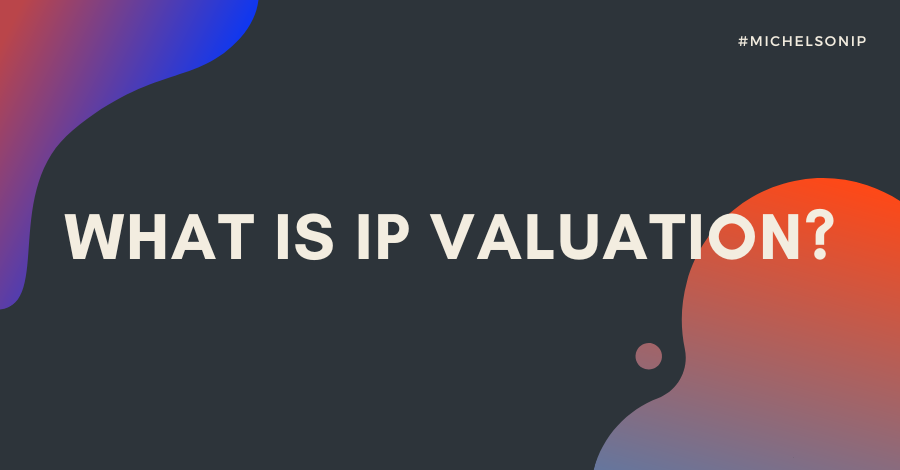When you are starting a business, one of the most important things to think about is your intellectual property (IP). Your IP is what makes your business unique and gives you a competitive advantage.
In this article, we will discuss the role of IP when it comes to startup valuation and answer several common questions. Let’s start with a look at first defining what IP valuation is.
What is IP Valuation?
IP valuation is the process used to evaluate the arm’s length or fair market value of IP assets . Intellectual property valuation helps to determine not only the value of the IP, but the true value of the business as a whole (Valentiam Group). Before you can get a valuation for your startup, you need to have a clear understanding of your IP portfolio. This includes any patents, trademarks, copyrights, or trade secrets that you have. Without this information, it will be difficult to accurately assess the value of your business. Furthermore, if you wait to establish your IP portfolio until after you have already received a valuation, you may find that your valuation is much lower than it could have been.
How do different forms of intellectual property correlate with the value of a startup?
IP is often considered one of the most important assets of a startup company. IP can take many forms, including patents, trademarks, copyrights, and trade secrets. Each type of IP can offer different benefits and protection for a startup. For example, patents can provide exclusive rights to an invention or process, which can be highly valuable. Trademarks, on the other hand, can help to distinguish a company’s products or services from those of its competitors. A copyright can protect original creative works, such as software code or website content.
In a word, different types of IP can correlate with the value of a startup in different ways, depending on the nature of the business and the types of intangible assets it holds. By protecting key assets, IP can help to create and sustain value for a startup.
Does high-value IP always equal high startup valuation?
In the world of startups, IP is often seen as a valuable commodity. After all, it’s the foundation on which many companies are built. But does high value IP always equate to high startup valuations? That’s not necessarily the case. In fact, there are a number of factors that can impact a startup’s valuation, including the stage of the company, the size of the market, and the overall financial health of the business. That’s not to say that IP isn’t important, but it’s just one piece of the puzzle when it comes to startup valuations.
What resources can you use to help determine the value of your IP?
When it comes to IP, the question of value is a complex one. There are many factors to consider, including the type of IP, the stage of development, the potential market, and more. As a result, there is no simple answer when it comes to valuing IP. However, there are a number of resources that can be helpful in this process.
Firstly, the World Intellectual Property Organization (WIPO) offers information and resources to help you determine the value of your IP. According to their website, there are 3 primary methods for valuing IP, including:
- The income method: values IP on the amount of economic income it is expected to generate. This method is best to use when the IP creates a positive cash flow that can be estimated with some degree of reliability.
- The market method: compares the actual price paid for the transfer of rights to a similar IP asset under comparable circumstances.
- The cost method: establishes the value of an IP asset by calculating the cost of a similar IP assets.
Another useful resource is the USPTO website, which provides information on various types of IP and how they can be protected. The USPTO also offers a searchable database of patent applications, which can be helpful in identifying trends and assessing potential markets.
Additionally, you can consult with a patent attorney or licensing expert. These professionals can provide you with an estimate of the potential value of your IP based on their experience and knowledge of the market.
Finally, there are a number of private companies that offer services for valuing IP. Last year, Michelson IP co-produced an Ask Me Anything event with our partners at inventRight and Ocean Tomo CEO James E. Malackowski. According to a report by the firm–specializing in IP valuation–95% of the market value of the S&P 500 comes from intangible assets. Companies such as these typically have extensive experience and knowledge in this area, and they can provide valuable insights.
Regardless of the method you use to calculate the value of your IP, it’s wise to value your IP before valuing your startup to ensure your business is valued accurately and taking all intangible assets into account.
If you’d like to learn more about your IP and its role in startup valuation, please check out our book, The Intangible Advantage.
_________
The Michelson Institute for Intellectual Property, an initiative of the Michelson 20MM Foundation, provides access to empowering IP education for budding inventors and entrepreneurs. Michelson 20MM was founded thanks to the generous support of renowned spinal surgeon Dr. Gary K. Michelson and Alya Michelson. To learn more, visit 20mm.org.


IP is the most important property rights for a start-up company. It is good to have a clear idea on how to valuate or know the true Value if the start up company.
This is well informed useful information. I will use it to educate my team of inventors and innovators